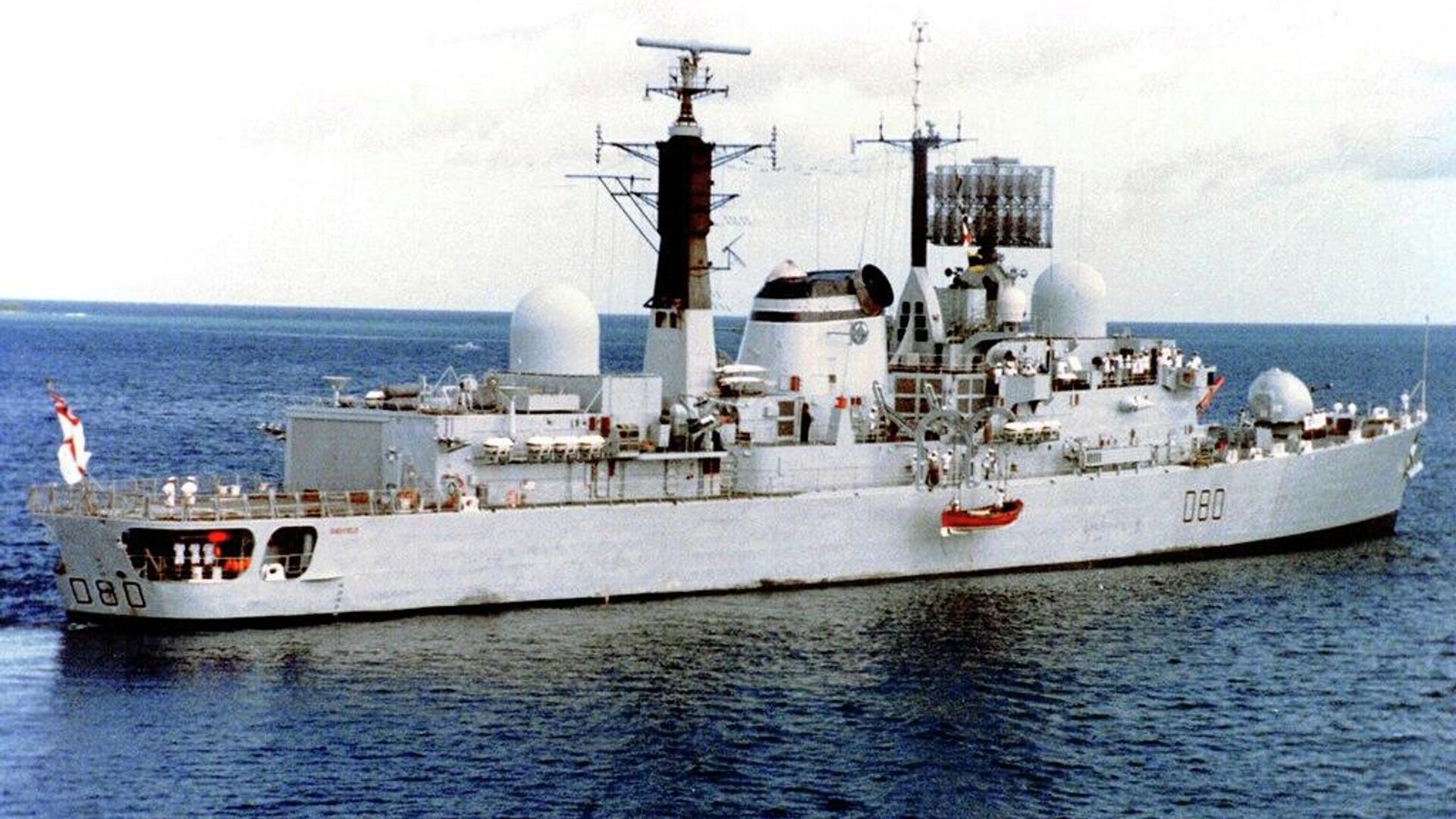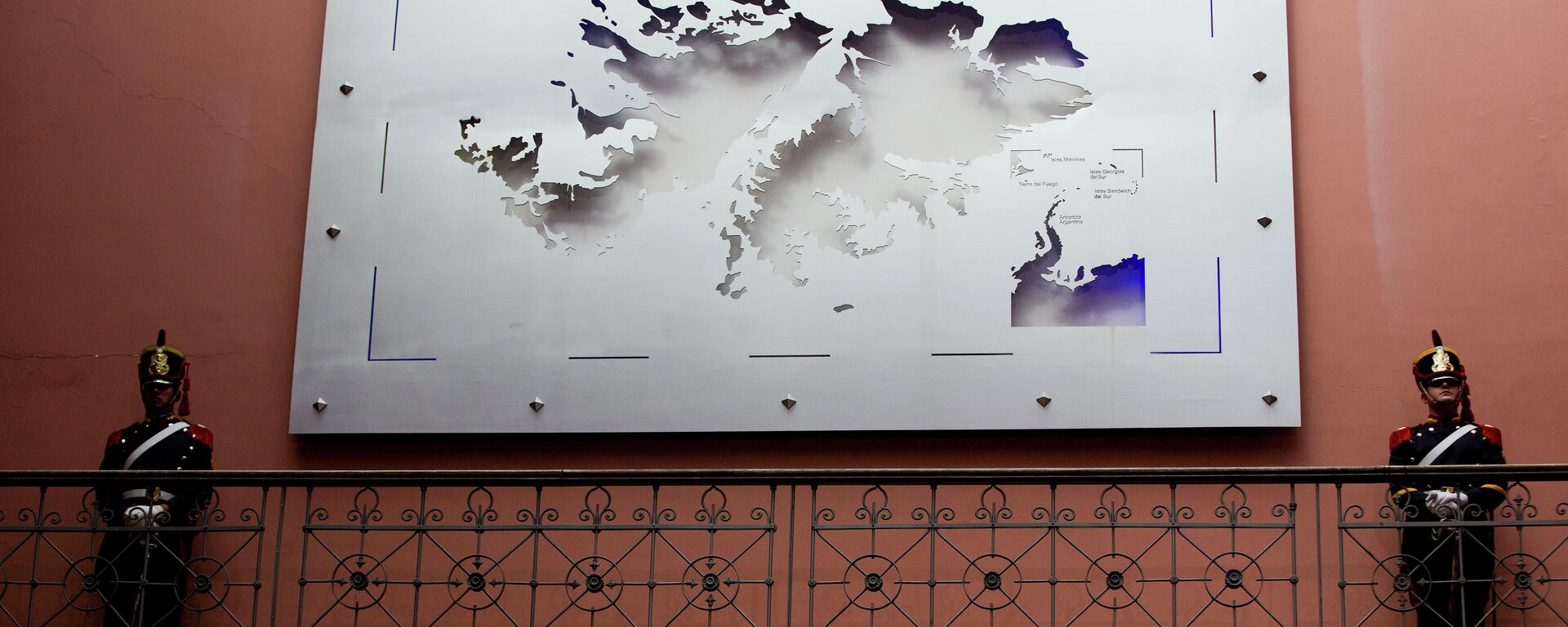https://sputnikglobe.com/20220504/mps-urge-probe-into-claims-france-hid-exocet-kill-switch-info-able-to-save-uk-lives-in-falklands-1095251855.html
MPs Urge Probe Into Claims France Hid Exocet ‘Kill Switch’ Info Able to 'Save UK Lives' in Falklands
MPs Urge Probe Into Claims France Hid Exocet ‘Kill Switch’ Info Able to 'Save UK Lives' in Falklands
Sputnik International
During the Falklands War, Argentine warplanes carrying French-built Exocet anti-ship missiles struck and heavily damaged the UK Royal Navy destroyer HMS... 04.05.2022, Sputnik International
2022-05-04T07:30+0000
2022-05-04T07:30+0000
2023-05-28T15:19+0000
france
falklands war
margaret thatcher
united kingdom (uk)
https://cdn1.img.sputnikglobe.com/img/07e6/05/04/1095251191_0:30:1024:606_1920x0_80_0_0_70a018e847566399e65217ba8aed432a.jpg
Senior MPs are demanding an inquiry into reports that France withheld information that its Exocet guided missiles, used by Argentine during the 1982 Falklands War, contained a "kill switch" that could have disarmed them, The Telegraph reported.On the 40th anniversary of the sinking of the HMS Sheffield, which was hit by French-made missiles launched from Super Etendard strike fighters, Tobias Ellwood, the chairman of Parliament's Defence Select Committee, said the matter "warrants further investigation".Former UK Defence Secretary Liam Fox was quoted as saying that France should be "open and honest" on the issue.The attack on the HMS Sheffield on 4 May 1982 resulted in Britain’s first fatalities in the conflict, with 20 men of the 281 crew members killed and another 26 injured. The wreck of the vessel has since remained a war grave, designated as a protected place under the Protection of Military Remains Act 1986.Besides the HMS Sheffield, two other Royal Navy ships were hit by Exocets during the conflict. The merchant vessel Atlantic Conveyor, hit on 25 May 1982 by two Argentine air-launched AM39 Exocet missiles, sank while under tow. 12 sailors died.Secret ‘Kill Switch’As the Royal Navy task force sailed towards the Falkland Islands archipelago in the South Atlantic Ocean during the full-blown conflict that erupted between the United Kingdom and Argentina in 1982, Britain is said to have appealed to its ally, France, for information about how the missiles worked and whether they could be disabled.France denied that a disabling device existed, sources are cited as saying. However, British officials came to believe this was not true, partly due to investigations carried out in the UK on an earlier variant of the missile.Admiral Lord West, a former First Sea Lord who commanded the frigate HMS Ardent during the Falklands War, was cited by The Telegraph as saying he had heard of the alleged “kill switch” in Exocet missiles. He also claimed that Britain was denied details of the technology.According to the admiral, at the time, Aerospatiale was making a lot of sales of the missiles, and would not have wanted buyers to know there was a way of disabling them.Francois Mitterrand, then-president of France, is said to have been directly approached by Margaret Thatcher, who was UK prime minister at the time, for information about the missiles.Furthermore, Thatcher reportedly threatened to launch a nuclear attack on Argentina if Mitterrand was not forthcoming on the information regarding the Exocets.The call for an inquiry was supported by Bob Seely, a Tory MP who sits on the Foreign Affairs Select Committee.There has not yet been any official comment from the British Ministry of Defence or Downing Street.Wednesday will witness the unveiling of a memorial to the 20 sailors who died on board the HMS Sheffield at the National Memorial Arboretum in Staffordshire.The Falkland Islands is an archipelago in the South Atlantic Ocean which is a self-governing British Overseas Territory. Argentina claims ownership of the territory, and in April 1982 the former military government led by Leopold Galtieri sent troops to reclaim the disputed islands, which Buenos Aires calls the Islas Malvinas.The UK was victorious, defeating Argentina after a two-month-long conflict, with the Falklands War in total resulting in the death of 649 Argentinian soldiers, 255 British servicemen, and three Falkland Islanders.
https://sputnikglobe.com/20220402/argentina-slams-uk-refusal-to-regard-falklands-dispute-as-still-pending-negotiation--resolution-1094417379.html
france
united kingdom (uk)
Sputnik International
feedback@sputniknews.com
+74956456601
MIA „Rosiya Segodnya“
2022
News
en_EN
Sputnik International
feedback@sputniknews.com
+74956456601
MIA „Rosiya Segodnya“
Sputnik International
feedback@sputniknews.com
+74956456601
MIA „Rosiya Segodnya“
france, falklands war, margaret thatcher, united kingdom (uk)
france, falklands war, margaret thatcher, united kingdom (uk)
MPs Urge Probe Into Claims France Hid Exocet ‘Kill Switch’ Info Able to 'Save UK Lives' in Falklands
07:30 GMT 04.05.2022 (Updated: 15:19 GMT 28.05.2023) During the Falklands War, Argentine warplanes carrying French-built Exocet anti-ship missiles struck and heavily damaged the UK Royal Navy destroyer HMS Sheffield on 4 May 1982. Of the 281 crew members, 20 died in the attack, while 26 were injured. The Sheffield became the first Royal Navy vessel to be sunk in action since World War II.
Senior MPs are demanding an inquiry into reports that France withheld information that its Exocet guided missiles, used by Argentine during the 1982
Falklands War, contained a "kill switch" that could have disarmed them, The Telegraph reported.
On the 40th anniversary of the sinking of the HMS Sheffield, which was hit by French-made missiles launched from Super Etendard strike fighters, Tobias Ellwood, the chairman of Parliament's Defence Select Committee, said the matter "warrants further investigation".
Former UK Defence Secretary Liam Fox was quoted as saying that France should be "open and honest" on the issue.
The attack on the HMS Sheffield on 4 May 1982 resulted in Britain’s first fatalities in the conflict, with 20 men of the 281 crew members killed and another 26 injured. The wreck of the vessel has since remained a war grave, designated as a protected place under the Protection of Military Remains Act 1986.
Besides the HMS Sheffield, two other Royal Navy ships were hit by Exocets during the conflict. The merchant vessel Atlantic Conveyor, hit on 25 May 1982 by two Argentine air-launched AM39 Exocet missiles, sank while under tow. 12 sailors died.
As the Royal Navy task force sailed towards the Falkland Islands archipelago in the South Atlantic Ocean during the full-blown
conflict that erupted between the United Kingdom and Argentina in 1982, Britain is said to have appealed to its ally, France, for information about how the missiles worked and whether they could be disabled.
France denied that a disabling device existed, sources are cited as saying. However, British officials came to believe this was not true, partly due to investigations carried out in the UK on an earlier variant of the missile.
Admiral Lord West, a former First Sea Lord who commanded the frigate HMS Ardent during the Falklands War, was cited by The Telegraph as saying he had heard of the alleged “kill switch” in Exocet missiles. He also claimed that Britain was denied details of the technology.
"I was told that the French were very helpful in terms of letting us see the flying of Mirages and the Super Etendard [French-built fighter aircraft used by Argentina] so we could get their flight profiles. They did give us a certain amount of material about Exocet, but I was also told there was a mechanism within it so that foreign people couldn't fire an Exocet at a French ship without them being able to do something to mean it wouldn't be able to hit them”, he said.
According to the admiral, at the time, Aerospatiale was making a lot of sales of the missiles, and would not have wanted buyers to know there was a way of disabling them.
Francois Mitterrand, then-president of France, is said to have been directly approached by Margaret Thatcher, who was UK prime minister at the time, for information about the missiles.
Furthermore, Thatcher reportedly threatened to launch a nuclear attack on Argentina if Mitterrand was not forthcoming on the information regarding the Exocets.
"We don't know the wider decision-making that surrounded this. Indeed, those responsible might not even be alive today. As we look to future battles we must learn from past events, and that includes how we work with allies and how we share critical intelligence. It certainly would have been game-changing had France chosen to share this characteristic of the Exocet", Tobias Ellwood was cited by the outlet as saying.
The call for an inquiry was supported by Bob Seely, a Tory MP who sits on the Foreign Affairs Select Committee.
"If Exocets contained what was effectively an on/off switch, the French should have shared that with us. If it turns out that information was withheld, that would be one of the most shameful episodes in Anglo-French relations. It may be that the French did tell us all there was to know, but we need them to be transparent", said Seely.
There has not yet been any official comment from the British Ministry of Defence or Downing Street.
Wednesday will witness the unveiling of a memorial to the 20 sailors who died on board the HMS Sheffield at the National Memorial Arboretum in Staffordshire.
The Falkland Islands is an archipelago in the South Atlantic Ocean which is a self-governing British Overseas Territory. Argentina claims ownership of the territory, and in April 1982 the former military government led by Leopold Galtieri sent troops to reclaim the disputed islands, which Buenos Aires calls the Islas Malvinas.
The UK was victorious, defeating Argentina after a two-month-long conflict, with the Falklands War in total resulting in the death of 649 Argentinian soldiers, 255 British servicemen, and three Falkland Islanders.




